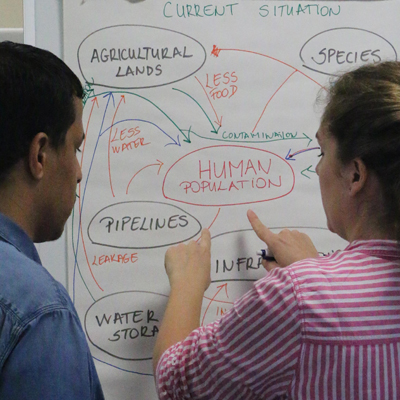The Centre for Energy Systems and Strategy (CESS) is a hub for leading-edge research, teaching and consultancy that helps individuals, businesses and policy makers by modelling and analysing the requirements and needs of the energy and power consumers and the underlying infrastructure systems using socio-technical frameworks.
A particular focus of the CESS is the development of tools and methods to inform the trade-offs associated with transition to a net zero economy, ranging from households to city to national levels. All our research and teaching activities can be categorised in three broad themes:
Digitisation of energy systems
Managing a grid with a large share of intermittent renewable resources in a cost-effective way is contingent upon having the observability and controllability of what is happening in real or near-real time, what is likely to happen next and what actions should be taken to get optimal results. The roll-out of smart meters, along with the increasing availability of new forms of user data from crowdsourced platforms such as social media, mobile phones and apps, offers an immense opportunity to improve our understanding of consumers' energy behaviours and preferences, and the UK’s changing energy mix in near real-time at a low geographical resolution. Combining this data with that collected from other non-energy domains and the use of techniques like machine learning and hierarchical analytic methods means that future energy system research can recognise tipping points, emerging patterns, interdependencies and end-user behaviours in near real time.
Our growing research portfolio includes projects and outputs to tackle this challenge:
- New methods and data for energy research
- Peer-to-peer energy trading in a community microgrid
- Energy infrastructure planning in South Africa through partnership
- Understanding and managing cyber security risks for low-carbon mobility-as-a-service applications
Infrastructure system planning and operation
Power networks are increasingly becoming interactive and interdependent with other infrastructure systems, such as gas, heating, and transport, where energy is a critical part of a wider ecosystem. The electrification is taking place as a vital role in decarbonising these complex systems and infrastructure. Here we conduct planning and operation of renewable power systems, transport electrification and a decarbonised hydrogen network to build up sustainable energy infrastructure for net zero targets.
- Aircraft to grid charging system
- Achieving a net zero carbon railway
- Developing a set of tools and models to better predict, assess and respond to disasters in Africa
- Techno-environmental analysis of battery storage for grid level energy services
Socio-technical aspects of energy transitions
The adoption and diffusion of new technologies is shaped by consumer preferences, infrastructure systems, policy and regulatory frameworks, markets and wider organisational systems. We adopt socio-technical lenses to analyse the influence of these factors and their emerging impacts on society in terms of distribution of benefits and disbenefits.
Some of our current projects and relevant outputs are as follows:
- OPTEMIN
- Sustainability and livelihood impacts of CSP plants
- Innovative network pricing to support the transition to a smart grid in a low-carbon economy
- Spatial variation in energy attitudes and perceptions: evidence from Europe
- Regional distribution of photovoltaic deployment in the UK and its determinants: a spatial econometric approach
- Spatially uneven development and low carbon transitions: Insights from urban and regional planning
- One technology, two pathways? Strategic niche management and the diverging diffusion of concentrated solar power in South Africa and the United States




